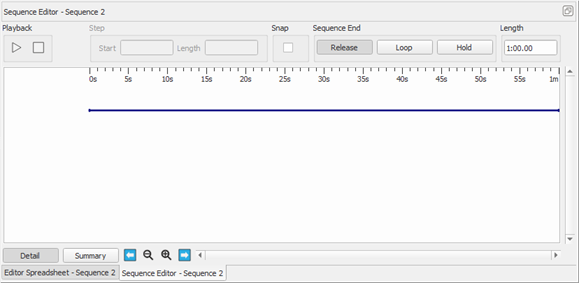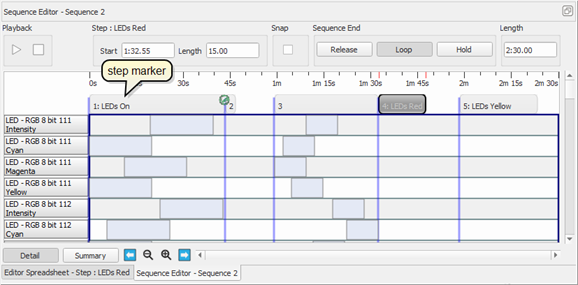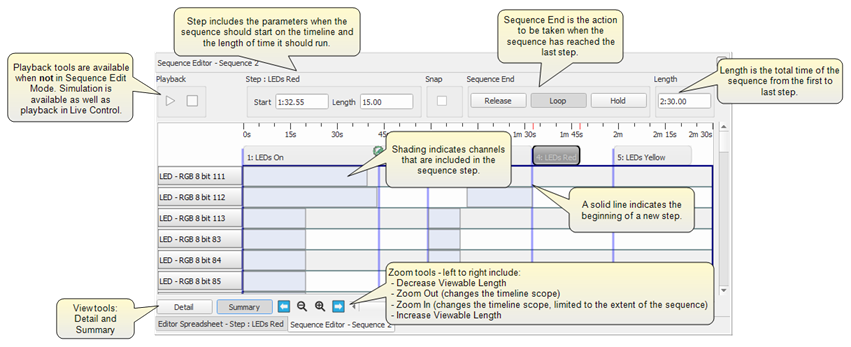
A sequence must be placed in Edit Mode before adding steps, modifying steps, or altering step timing. Click the [Edit] button on the sequence icon in the Presets Directory, or right-click on the sequence in the Browser and select "Edit Sequence" from the context menu. The Sequence Editor tab will display in focus if it was previously stacked on a tab behind the Editor Spreadsheet. The Sequence Editor displays as a timeline view. You can build your sequence steps using existing presets and macros.

Sequence steps are created as a copy of an existing preset or macro. With the sequence created and placed into Edit Mode:
drag and drop an existing preset from the Preset Directory into the timeline view
drag and drop an existing macro from the Browser into the timeline view
A sequence step is created each time a preset or macro are placed into the editor. Steps are selectable from the Sequence Editor or the Browser, and the properties can be set using the Property Editor or the Editor Spreadsheet.
Note: Adding a preset to a timeline in the Sequence Editor creates a copy of the preset. The copied preset is NOT a reference to the source and therefore any edits made to the original preset after creating the sequence step will not be reflected in the sequence.
With the sequence in Edit Mode, right-click inside the Sequence Editor timeline and select "Create Sequence Step" from the context menu.
With the sequence in Edit Mode, you may move the entire step in time, or while in the Detail view adjust the timing of individual channels within the step.

Edit the sequence step in the Editor Spreadsheet by selecting the step from the Browser or selecting the step from the Sequence Editor, and then making the edits in the Editor Spreadsheet or changing the properties in the Property Editor.
With the sequence in Edit Mode, you can change its settings including, snap behavior, sequence end behavior, and the length of the sequence.

The Sequence Editor provides a [Start Sequence] and a [Stop Sequence] button for playback of the currently selected sequence. While the sequence is running, the buttons change to [Pause Sequence] and [Stop Sequence]. While the sequence is paused, the buttons change to [Resume Sequence] and [Stop Sequence].
Note: Sequence playback cannot be simulated while in sequence Edit Mode.
The Sequence Editor provides a Snap checkbox that, when selected, snaps movement of sequence steps and channels to the increment marks on the timeline ruler. The increment marks are determined by the current zoom level.
Configure the Sequence End behavior.
This property box allows you to indicate the length of time the sequence will run in hours, minutes and seconds (example 1h 1m 3s). This property may not be set less than the end time of the last step in the sequence.
The Sequence Editor offers two view types, the Detail view and the Summary view which are provided as buttons on the bottom left corner of the Sequence Editor.
The Sequence Editor offers tools to zoom the timeline. From left to right, the Zoom tools include: